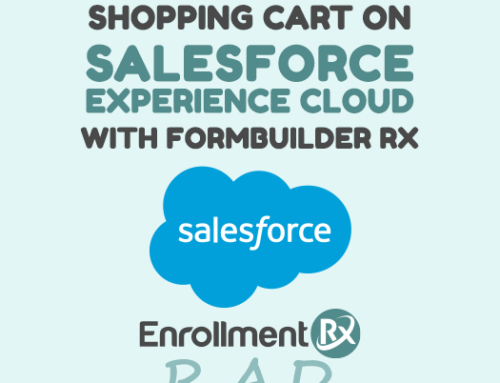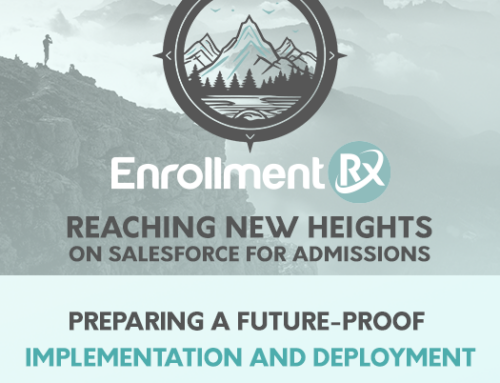What Higher Education Admissions Software Taught Me About Start-Up Organizations
“We are organized like a start-up. Apple is the biggest start-up on the planet.” -Steve Jobs
What the heck was Steve Jobs talking about?
After years of experience in the higher education admissions software sector, the answer finally came to me.
When Selecting Higher Education Admissions Software, is it Better to Choose Solutions from a Big Company or a Boutique Organization?
I’ve been the founder and CEO of a higher education admissions software company for the past 15 years. During that time, I have come to appreciate the benefits of boutique organizations. In most cases, these are small businesses which commonly behave as start-ups.
Steve Jobs was inspired by the inherent benefits of small businesses and their management teams and modeled Apple in the same spirit as these companies. He famously said, “We are organized like a start-up. Apple is the biggest start-up on the planet”.
It took me years to understand what Jobs meant, mainly because Apple was already a massive company with decades of leadership in their respective market when he made this statement. Clearly, they were no longer a start-up, and what does it mean for a multi-billion dollar company to be “organized like a start-up” anyway? For a long time, I couldn’t relate to what was so special about being a start-up organization or why Jobs would find it so appealing for a large corporation to emulate.
The lightbulb moment occurred during one of our weekly product meetings, which finally revealed the benefits of a “start-up” business and made me understand that our company has always intuitively used the small business model to our advantage. It also made me realize the alternative model to innovation from small businesses is when large companies decide to launch skunkworks projects in a particular sector, as this article from 2014 describes well.
Leadership Lessons in Small Business Innovation from Higher Education Admissions Software
What are the product meetings like at Enrollment Rx, and how does this small business deliver ongoing, leading-edge innovation in higher education admissions software? Unlike the lack of coordinated strategic decision-making that often occurs in the vacuum of big company skunkworks projects, Enrollment Rx brings together a group of highly experienced leaders from each department to provide voice and guidance to the product roadmap. We balance the needs of each area with the available resources and expertise at our disposal to realistically deliver solutions that clients want to license and renew.
It is important to recall that in a small organization like Enrollment Rx, leadership is unavoidably involved in almost every element of the business. While some of us focus on driving the sales and marketing strategy, others lead the implementation, customer support, and product development efforts. The segmentation of responsibilities allows us to focus each director’s strengths on the business areas that would most impact customer success and company growth. It also allows us each to learn different but valuable lessons from our constituents, which we bring back and share with the group.
For example, as President, I regularly interact with potential customers, vendors, and even competitors in the industry. I can closely watch what works and doesn’t work in each sales opportunity and adjust accordingly to improve our position in the market. I attend most of the sales demonstrations for our prospective clients and staff the industry trade shows where I talk with prospective clients and other personnel. Being so close to the sales action helps me make informed executive decisions, often using the knowledge I have gained first-hand rather than relying on reconveyed information. I can also relate to the challenges of our sales team because I can help delineate between obstacles that hinder our sales opportunities versus barriers that may be surmountable if tackled from a different approach. Conversely, exposure to so many ideas and opinions, coupled with my potentially unbridled enthusiasm as an entrepreneur, could be problematic if not properly managed, as I will describe in a moment.
As another executive leadership member of our company, our COO is personally responsible for overseeing our higher education admissions software’s implementation, support, and product development strategy. He is at the front lines of most implementation projects and is ultimately responsible for customer support. He is one of the primary people our company turns to when we don’t know the answer to a technical problem. He is responsible for weighing all product suggestions against the product development strategy to prioritize our development roadmap most efficiently.
Our team includes a phenomenal group of additional directors and staff who work diligently to support our clients. We have at least two company-wide meetings per week to gather feedback and input from our people on the front line (both implementation and support) and inculcate that into our higher education admissions software strategy. In an ever-changing landscape, we rely on our team of experts to make wise decisions that will keep our company’s products aligned with market expectations. This mirrors the model that Jobs discusses, where he describes that Apple “has no committees”. Their leadership team would meet once a week for a few hours and talk about their strategy. They would argue their ideas, debate vigorously, and let the best ideas win! I believe that when Jobs said “ no committees”, he meant “no skunkworks projects”.
Skunkworks Projects or Small Business Innovation in Higher Education Admissions Software?
Speaking of skunkworks and ideas gone awry, I indicated that sometimes my constant exposure to new opinions means that I come bounding into product meetings with “the next big idea” that I am confident we should develop. It is often only about 30 seconds after I begin to explain the new idea to the group that the “cold water starts flying”. The team will typically raise extremely valid objections that I could not have considered due to my lack of experience in their area of expertise; be it implementation, support, or product development.
They point out that no customer support ticket has ever asked for the feature I describe, and the required development effort would not make implementation projects any easier. In other words, higher education admissions software customers are not asking for that feature, and our team feels it would not improve our support capabilities. Moreover, they will ask which of our good ideas we should postpone while we work on this new (bad) idea? As you may imagine, many ideas get dropped at that point, and we move on to more meaningful conversations, having immediately saved the company incalculable time and money.
Working together, our leadership team can connect many of the necessary dots required to deliver a product to market that is sellable and supportable by the higher education admissions software industry we serve. This is because of the nature of our boutique organizational structure, which is composed of highly experienced and specialized individuals who create products designed to maximize return on investment for our customers. We have a good sense of what to build and how best to deliver it to actually be realistically competitive in the higher education admissions software sector.
Most importantly, as a small business, we remain responsible for the outcome of each project, as we make our living in this sector where our good reputation is of the highest value. We cannot afford to sell systems to clients that are not the right fit, as projects would struggle and good referrals would be too few. On the other hand, when sold correctly, higher education admissions software can be transformative for institutions, and user adoption is very successful. In my experience, both as a vendor and as a customer, smaller boutique firms usually offer the best blend of service and technology, with the necessary support to ensure future-proof innovation.
Visit our website to learn how Enrollment Rx can help your institution with tailored products, services, and support to increase recruitment and admission management success.




